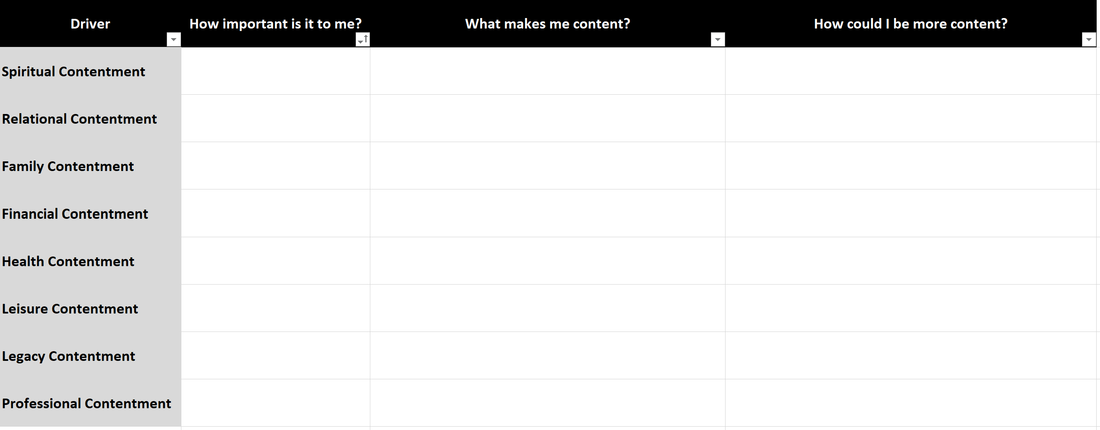|
Recently Patty and I met up with our financial advisor to walk through our long-term finances. A key component of that discussion was about our net worth, defined as assets minus liabilities. While we had a very fruitful discussion that resulted in some great take-aways, it got me to thinking about how easy it is to focus on a single aspect of one's life and derive how good (or bad) one might be doing based on that aspect. Don't get me wrong; one's net worth is certainly an important measure that needs to be tended to. My point is that there is more to life than net worth when looking at your overall contentment. This hit home for me with the suicides of famous figures Robin Williams, Anthony Bourdain, Kate Spade, and others. These are people who appeared to have it all but to them something was so missing that it caused them to commit a horribly sad act. Lives ended too early; my prayers go to their loved ones. In thinking about contentment, I looked hard at what, to me, are the most important driving factors behind contentment. Keep in mind my analysis is not from a point of scientific expertise; rather it is from a point of practicality as to what I think are the most important drivers. I've honed my list to 8:
Now I completely realize that some of these above drivers are extremely important to some or not at all important. My point is not to second guess your importance level; what I do believe necessary is to decide how important each of the above drivers are to you. If something is not at all important to you then that is certainly your choice. Just be mindful of avoiding something that could adversely impact you later. As example, if you say financial contentment is not at all important and you decide not to financially plan for the future then you might be creating a problem for yourself later in life. So what now? I put together a simple excel spreadsheet which allows you to assess, for each of the contentment drivers, how important it is to you, what makes you content, and how you could be more content. I think it's important to articulate both what makes you content and how you could be more content for a couple of reasons. First, it allows you to celebrate things you are already happy with. Second, it enables you to improve on some things which you may already be doing well. If you find this helpful, you can download the excel template to help you self-assess yourself based on the 8 drivers. Download it here. As always, would love to hear what you think. let me know your thoughts in below comments. Lonnie Pacelli
Keynote Speaker | Board Director | Autism Advocate | Author | Project Management Expert | Microsoft/Accenture Veteran See his books on Amazon.
1 Comment
|
Topics
All
Reprints
Contact Lonnie about article reprints. Please specify article you wish to reprint. Backlist
See Lonnie's Amazon Author Page Archives
July 2024
|
Lonnie Pacelli - Building Thriving Leaders™
Insightful | Creative | Direct Advice to Help Leaders Help Themselves
Keynote Speaker | Board Director | Autism Advocate | Author | Project Management Expert | Microsoft/Accenture Veteran
See his books on Amazon
Insightful | Creative | Direct Advice to Help Leaders Help Themselves
Keynote Speaker | Board Director | Autism Advocate | Author | Project Management Expert | Microsoft/Accenture Veteran
See his books on Amazon
Services |
About
|
© COPYRIGHT 2019. ALL RIGHTS RESERVED.
We are a participant in the Amazon Services LLC Associates Program, an affiliate advertising program designed to provide a means for us to earn fees by linking to Amazon.com and affiliated sites.
|


 RSS Feed
RSS Feed